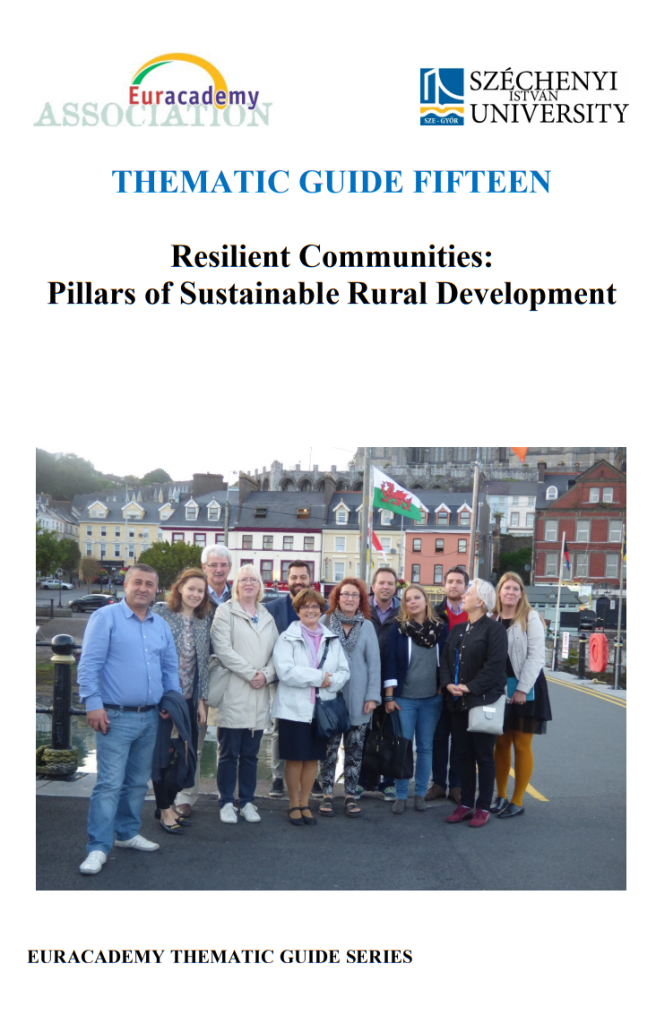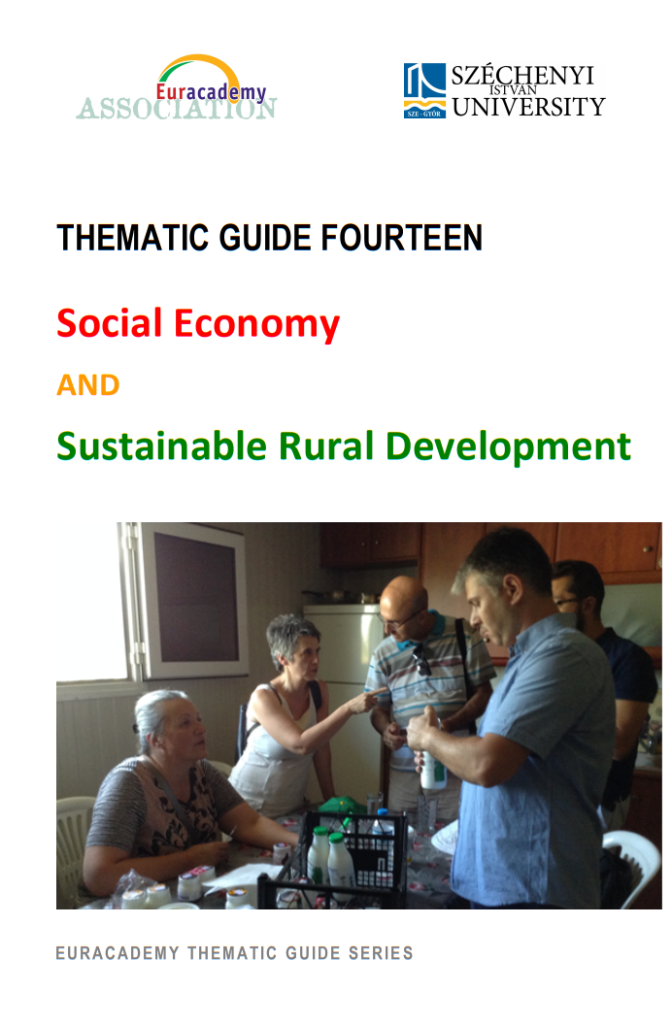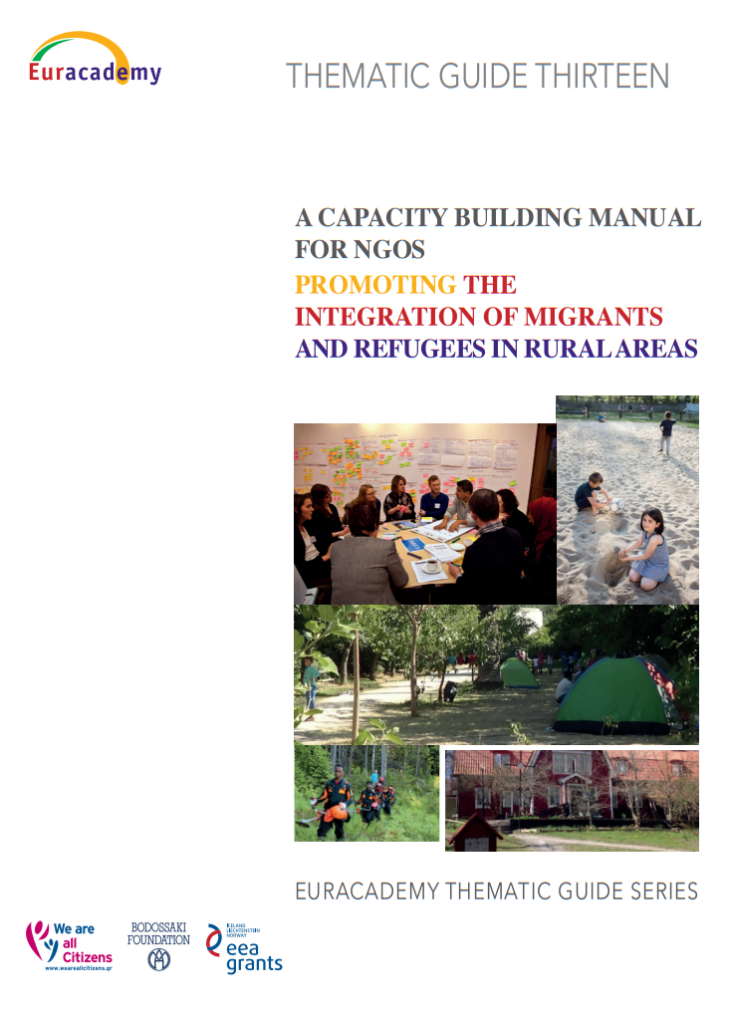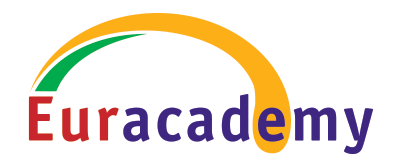The Thematic Guides that have been used in the Summer Academies were revised and enriched in the light of the Summer Academies, adding useful Thematic manuals in the European bibliography of sustainable rural development. The two first Thematic Guides have been listed by CEDEFOP in the library of the Training Village.
Pillars of Sustainable Rural Development
This is the 15th Thematic Guide in the Euracademy series. It exploits the lectures, case studies and discussions held in the 16th Summer Academy, held in Middleton, Cork, Ireland, from 3rd to 8th September 2017, organised in cooperation with SECAD Partnership. This Thematic Guide aims to explore, together with the reader, such questions as:
What are the definitions of resilience and how can they apply to rural Europe? What are the converging economic and ecological challenges rural communities in Europe face today? What are the links between resilience and sustainable rural development? What are the changes in lifestyle rural communities need to bring about in order to become more resilient? What can we learn about resilient communities from best practices in Europe and elsewhere in the world? How can we identify community resources and needs, and design an environment from which creativity and collective effort can emerge? How can we propose strategies and models to shift current policies to support and foster community resilience? What are the steps a rural community needs to take in order to establish a resilience-building plan?

Social Economy and Sustainable Rural Development
This is the 14th Thematic Guide in the Euracademy series. It exploits the lectures, case studies and discussions from the 15th Summer Academy in Mouzaki, Karditsa, Greece, from 16th to 23rd July 2016, which was organised in cooperation with the Karditsa Development Agency ANKA.
The target group for this Thematic Guide includes managers and staff of social enterprises and cooperatives based in rural areas; managers and animators of rural development based in Local Development Agencies; local and regional authorities or similar organisations, including NGOs; rural businesses; policy and decision makers; and researchers, academics, training providers, students and experts in related fields.

A Capacity Building Manual For NGOs Promoting the Integration of Migrants and Refugees in Rural Areas
The 13th Thematic Guide, “A Capacity Building Manual For NGOs Promoting the Integration of Migrants and Refugees in Rural Areas” was prepared by Euracademy Association members with the help of experts. It addresses actors in the field of integration of migrants and refugees in rural areas, such as NGOs, local development agencies, local governments and decision makers, and aims at provoking the reader’s thinking on such questions as: How can NGOs operating in rural areas enhance social cohesion, referring in particular to the integration of immigrant and refugee groups? What can we learn from examples of best practice across Europe?

Volunteering and Sustainable Rural Development
The 12th Thematic Guide on “Volunteering and Sustainable Rural Development” was prepared by Euracademy Association members with the help of several experts in rural development. It aims to provoke the reader’s thinking on topics such as: How can volunteering enhance local democracy and decision making processes in rural areas? What is the role of local leaders / animators in stimulating volunteering?How can we define the LEADER methodology to encourage volunteering? How can volunteers become involved in the preservation, interpretation and promotion of the natural and cultural heritage of their localities?
Culture and Landscape: Contributions to Sustainable Rural Development
The 11th Thematic Guide on “Culture and Landscape: Contributions to Sustainable Rural Development” was prepared by Euracademy Association members with the help of experts. The guide includes eleven chapters that aim to provoke discussions on the challenges that rural landscapes are facing in relation to their heritage and cultural makeup; the contribution of the European Landscape Convention to the preservation of the cultural elements of landscapes and the mobilisation of local communities; the contribution of the creative industries in highlighting and valorising the links between culture, landscapes and heritage.
Local Governance and Sustainable Rural Development
The 10th Thematic Guide on “Local Governance and Sustainable Rural Development” was prepared by Euracademy Association members with the help of experts. The guide includes six chapters on local governance as multi-level partnerships and networks, the role of rural animators, participative governance and the prospects for EU Rural Policy, learning networks and others.
Social Innovation and Sustainable Rural Development
The 9th Thematic Guide on “Social Innovation and Sustainable Rural Development” was prepared by Euracademy Association members with the help of experts. The guide includes seven chapters on the concept of social innovation, the relation between social innovation and sustainability, the link with enterpreneurship and several case studies from across Europe. The Thematic Guide was revised following the input of participants at the 9th Summer Academy and has been further enriched with case studies.The guide was published in 2011.
Sustainable Agriculture and Rural Development: an integrated approach
The 8th Thematic Guide on “Sustainable Agriculture and Rural Development: an integrated approach” was prepared by Euracademy Association members with the help of experts. The guide includes six chapters on the contribution of sustainable agriculture to rural development, the consumer movement, the impact of sustainable agriculture on the environment and landscape, the institutional context of sustainable agriculture and local governance and the role of rural animators.
Sustainable 2020 for Rural Environment in Europe
The 7th Thematic Guide on “Sustainable 2020 for Rural Environment in Europe” was prepared by Euracademy Association with the help of experts. It includes six chapters which provide an overview of current environmental issues, climate change, sustainable agriculture, protected areas, landscape and awareness raising about environmental issues. This Thematic Guide was revised and enriched with further case studies following the input of the participants at the 7th Summer Academy and was published as an e-document in English.
Culture and Sustainable Rural Development
The 6th Thematic Guide on “Culture and Sustainable Rural Development” was prepared by a team of Euracademy Association members and other experts. It includes three parts. Part I sets the scene on rural culture, rural heritage and discusses the close ties between culture and sustainable rural development. Part II discusses rural culture as an agent of development for rural areas and includes case studies from all over Europe on the topic. Part III deals with the planning of rural development with a focus on culture and includes case studies linking the topic with national and European policies.
The Role of Education and Lifelong Learning in Sustainable Rural Development
The 5th Thematic Guide on “The Role of Education and Lifelong Learning in Sustainable Rural Development” was prepared by a team of Euracademy Association members and other experts. It includes two parts. Part I discusses education and lifelong learning as agents of change in rural areas and introduces the new “tools” that are available through ICT, which increase the access of rural residents to all grades and aspects of education throughout life. Part II describes the new methods of delivery of primary, secondary, vocational and tertiary education that make such education accessible to rural residents in particular.
Social capital and Sustainable Rural Development
The 4th Thematic Guide on “Social capital and Sustainable Rural Development” was prepared by a team of Euracademy Association members and other experts, led by the Institute of Rural Research and Training of the Helsinki University. It includes two introductory chapters on the definition of social capital and its analysis as a resource for sustainable rural development; and four further chapters discussing how social capital may be created from “bottom up” or “top down” and its contribution to economic development and cultural identity.
Diversification of Rural Economies and Sustainable Rural Development in the Enlarged Europe
The 3rd Thematic Guide on “Diversification of Rural Economies and Sustainable Rural Development in the Enlarged Europe” was prepared by a team of Euracademy Association members led by the Institute of Rural Sociology of N. Copernicus University, Poland. It includes an introductory chapter on the challenge of diversification and its origin; and five further chapters discussing the policy framework of diversification and the role of farmers, SMEs, public services and human resources in successfully applying the diversification policies. Thematic Guide Three was published in 2005 in English and was also translated into Polish.
Information Society and Sustainable Rural Development
The 2nd Thematic Guide on the theme of “Information Society and Sustainable Rural Development” was prepared by experts and included case studies from Euracademy’s project partners and students of the 2nd Summer Academy. It includes two theoretical chapters introducing the subjects of Sustainable Rural Development and Information Society respectively, while the remaining five chapters are devoted to the “players” in the Information Society arena
Developing Sustainable Rural Tourism
The 1st Thematic Guide on “Developing Sustainable Rural Tourism” was produced through the collaborative efforts of Euracademy project partners, and includes two theoretical chapters on Sustainable Rural Development and Sustainable Rural Tourism; and six more practical chapters presenting the elaboration of six themes pertinent to sustainable rural tourism with illustrated examples. These themes include the development of the tourism product, the management of natural and cultural heritage, sensitisation of the local community, the creation of synergies between tourism and other sectors of the economy, entrepreneurship and strategic planning.
